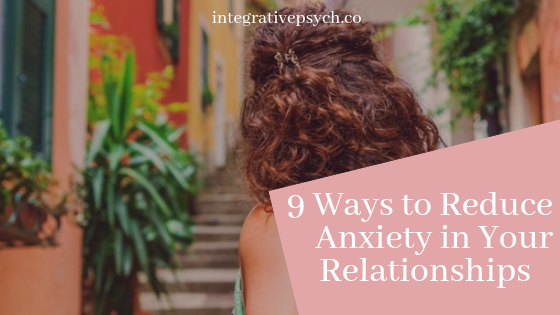9 Skills to Reduce Relationship Anxiety In Long Island
9 Ways to Reduce your Relationship Anxiety in Long Island
If you read last blog and got some insight into some of your relationship patterns, that’s great! Notice some anxiety and want to have more joy + less relationship anxiety? Read on.
9 ways to reduce relationship anxiety
Remind yourself: You can survive.
The heart is a muscle that expands and contracts. Hurt and disappointment do hurt, but you will be ok. If you’ve been experiencing anxiety or hurts in relationships, you may need to set new limits, choose different relationships, or a ten minute breather to process some tiring interactions. Remember, your mind + body are resilient and are adapting as you navigate life + love.
What’s my attachment style?
Knowledge is power, and therefore I encourage you to get to know which attachment style you may have (not sure? read this!). In session with clients, we often start with an attachment style questionnaire to get a sense of what your younger years were like, and how they are impacting how you show up today, in relationships. Some of the questions in an adult attachment interview are: What words would you use to describe your mother? How did she respond to you when you were sad, worried or angry? What events happened in your younger years that impacted your development?
Identify
Identify if you have anxiety in relationships by listening to your signals.
How do your body’s reactions to your partner let you know about how your relationship is doing?
What does your intuition tell you about spending time with that new friend?
What is your life vision, and are the people who are in it supportive to that.
Get to know the ways your gut communicates with you. When you’re with someone specific, do you feel at ease, comfortable to be fully who you are or do you tense up and hold your breath? Do you get belly aches, stuffed nose, difficulty breathing or a bad headache while or after spending time with specific people? Listen to the cues.
Stretch your limits
Want to challenge a pattern you’ve been using most of your life? Go out and engage with someone you naturally wouldn’t engage with. Be a bit more honest. Choose people who have good boundaries, have a history of healthy relationships and are authentically able to get to know another person. There’s no right way to do this. Try talking with someone for even a few moments and see what this experience is like for you.
M stands for Mindful.
Internally: Slow down, notice your thoughts and become aware of the way you’re carrying your body. How well are the beliefs serving you? “I’m too needy” how does that feel when you repeat that over and over VS “I’m struggling with loving others, but I’m taking one step today.” Notice which one gives you more hope and which one saps your energy.
Externally: Notice how you feel in the world around you. Are there places that feel like they support you, sooth you, help you strengthen the ability to see things from bird’s eye view and get out of narrow thinking and feeling? If yes, go there. If not, seek out a place that can offer you a “safe haven” where you can refocus.
Focus Inward.
Spend some time getting to know who you are and what you’re needing now. With people who have relationship anxiety, they often get pulled into codependent patterns, becoming hyper-focused on what the other person needs, what they think, or want. You might worry they’ll leave you if you don’t provide what they want or need, or you might just feel confused.
Take some time to focus on you. You’re allowed (and actually need to) have an idea of who you are and what’s important to you. The clearer you are on what you need, the richer your relationships can be with healthy partners, friends and family members.
Develop an Emotional Vocabulary.
There are common emotions people know; angry, sad, upset, happy, excited. What about other feelings? Disappointed, confused, frustrated, hurt, insulted, lost, intrigued, conflicted, ambitious? One of the first steps to being able to express yourself is developing a robust emotional vocabulary. When a child is given a label to their emotion being expressed, their bodies calm down and they feel understood. Find words that resonate with your inner experience and see what happens.
Cultivate Courage.
Taking accountability for your relationship patterns is a big step towards a more meaningful life. Courage is a trait that you’ll want to strengthen. Think of people who personify courage to you, and channel their strength. Engage in behaviors or activities that highlight your inner courage; contribute to a cause, engage in a physical sport that makes you feel capable, or listen to music that reminds you of the strength in humanity. Pave your brave path ahead.
Change starts with one step
Notice your patterns are keeping you stuck? One step is all it takes to shifting the way you show up to the world. Therapy with an attachment informed therapist will help identify the areas that you’re getting tangled in, and help you untangle the confusion or messes you’ve gotten stuck in. If you notice you’re lonely beneath the facade, that is also something to address in therapy. You need connections, and you can learn ways to cultivate them.
Cultivating connections is a human need. Do that with ease today!
Looking for more than self-help tips? Desiring more meaning in your life, and finding a better way of connecting is commendable. If something about this article gave you a little nudge, it may be time to seek a therapist who specializes in attachment, anxiety, relationship issues and trauma related issues.
Counseling for Relationship Anxiety in Long Island, New York
Live in the Five Towns, Nassau County or anywhere across Long Island are are serious about improving your quality of life? Reach out here.



